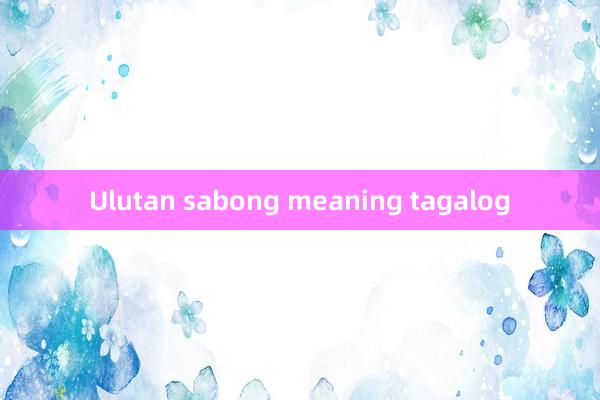Ulutan sabong meaning tagalog

Understanding "Ulutan Sabong" in Tagalog: A Cultural and Linguistic Insight
"Ulutan sabong" is a Tagalog phrase that has unique significance within Filipino culture, especially in the context of sabong, or cockfighting. Sabong has a long history in the Philippines and carries traditional, cultural, and social weight. The word “ulutan” specifically refers to the dynamic environment surrounding cockfighting events. In this article, we will explore the meanings of "ulutan" and "sabong," delving into their cultural relevance in Filipino society. We will also discuss how these terms resonate with people beyond the literal activity of cockfighting.
The Meaning of “Sabong”
Sabong is a term deeply embedded in Filipino history and culture. It specifically refers to cockfighting, a popular blood sport where two roosters are set against each other in a ring, often to the death. Cockfighting is not just a sport but a cultural institution in the Philippines, where it dates back over 3,000 years. Spanish colonizers noted its popularity during their rule, and it has remained a significant tradition ever since. Sabong takes place in large arenas known as “sabungan,” where people gather to witness and bet on the fights.
Beyond the sport itself, sabong represents an intricate mix of social interaction, cultural tradition, and community gathering. It is often held during festivals or community events, making it an integral part of Filipino life. The popularity of sabong persists, especially in rural areas, although urban Filipinos also participate in and attend these events. Sabong is not merely about winning or losing; it is a tradition that reflects elements of Filipino pride, skill, and camaraderie.
The Role of “Ulutan” in Sabong
“Ulutan” is derived from the Filipino word "ulot," which can mean to prepare, offer, or arrange. In the context of sabong, “ulutan” specifically refers to the strategic aspect of setting up and matching the roosters before they enter the ring. An "ulutan" is where trainers, handlers, and owners decide on which roosters will face off in a fight. Matching roosters involves careful consideration of each bird's fighting style, weight, and prior experience. It requires expertise and insight, as a well-matched fight is more exciting, ensuring fairness and making for a more engaging spectacle.
The “ulutan” process is often complex, and those involved must have a sharp eye for a rooster’s capabilities. Roosters are typically matched based on their history, and the stakes in each match can vary significantly. Participants, known as “mananabong,” watch with intense interest as handlers and owners work through this intricate selection process. In some cases, locals refer to those skilled in “ulutan” as having “mata sa ulutan,” or “an eye for matching,” a phrase that suggests the sharp intuition required to succeed in this role.
Cultural Impact of Ulutan and Sabong
play go88Sunwin đổi thưởngThe tradition of sabong, and specifically the ulutan process, contributes to the collective Filipino identity, especially among those in rural regions. For many, sabong serves as a way to bond with family, friends, and neighbors. People gather to witness the roosters' bravery and enjoy the spectacle, but also to engage in betting, socializing, and exchanging local news. The conversations that take place in the arena are often animated, touching on sports, politics, and community matters.
“Ulutan” in this context represents more than just rooster selection; it is part of a cultural process that emphasizes fair play, respect, and the art of competition. This process is sometimes accompanied by rituals that include blessing the roosters and giving them traditional healing ointments. All of these steps signify the depth of commitment that trainers and owners have for their roosters and the sabong tradition.
Sabong as a Reflection of Filipino Values
While cockfighting can be controversial in some cultures, it remains largely accepted and even celebrated in the Philippines. Sabong mirrors Filipino values of courage, determination, and loyalty. Roosters are trained for months, with their trainers providing extensive care, often likened to familial care, given the dedication required. This dedication underscores the importance of the sport to those who participate in it. It’s not simply a battle between animals; it is a display of personal investment, skill, and pride.
The camaraderie seen among the sabong participants—owners, trainers, spectators, and bettors—reflects a social unity that is very much part of Filipino values. Through sabong, Filipinos come together to support each other, laugh, and cheer, creating a sense of community that transcends the competition itself. It also allows people to share in a legacy passed down through generations.
Modern Views on Sabong and Ulutan
In recent years, sabong has evolved, especially with the rise of digital platforms that offer online cockfighting events, known as “e-sabong.” While traditionalists prefer the excitement and authenticity of live events, the online version has gained popularity. This shift has brought attention to the sport, with some questioning its ethical and moral implications. Despite the debates, sabong remains a part of Filipino culture, and the ulutan process continues to be respected for its cultural and traditional significance.
In summary, “ulutan sabong” in Tagalog represents more than just cockfighting; it encapsulates a deep-rooted Filipino tradition, a social event that brings people together in celebration, competition, and shared heritage. It’s a tradition that has weathered centuries and continues to thrive, bridging generations and binding communities in shared cultural pride. The intricate ulutan process, with its careful matching of roosters, reflects the skill and dedication involved in sabong, underscoring why it remains a cherished and enduring part of Filipino life.
Jili casinowww.claytonforschoolboard.com

